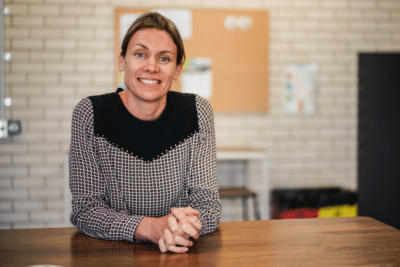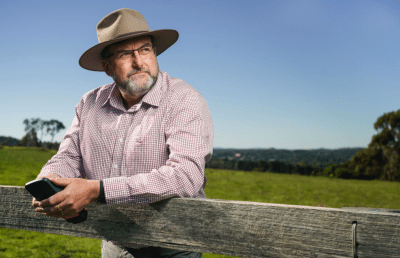A system that allows livestock producers to collect vital pedigree information – potentially saving money and boosting productivity – is one of the many early success stories of University of New England’s Smart Regional Incubator (SRI).
Although just eight months old, the SRI now has an impressive 30 start-up companies on its books – companies that may soon be contributing to the prosperity of regional Australia.
SRI Business Development Manager Liz Egan says it augurs well for the future.
“The stars are aligning around innovation in our region,” she said.
“There is terrific support from the State Government and never before have we seen such encouragement for people to step up and test their ideas. We see it every day at the incubator and the momentum is building. We’re keen to see the New England North West become a leader in innovation and we’re proud to be helping entrepreneurs realise their dreams.”
SmartShepherd
One of the well advanced SRI start-ups is the agricultural technology company SmartShepherd, which is taking Australian orders for its pedigree matching product and negotiating agreements for overseas distribution.
Co-founder and CEO Dave Rubie said it would never have been possible without the support of the SRI.
“I think there will be a couple of successes come out of the incubator in the very near future and we hope to be one of them,” he said.
“We would never have got to this point without its expertise and support. It has been very advantageous for us being close to UNE research centres and researchers, potential customers and representatives of government departments and agricultural companies.”
SmartShepherd provides a missing link in livestock parentage data – helping farmers to identify the relationship between mothers and their offspring. Not only will the collection of maternal pedigree data help guide future management decisions, Dave and his co-founder Glenn Vassallo hope it will increase animal welfare and profitability.
“SmartShepherd is capable of being used on all free-ranging livestock, including cattle and goats, but we have started with sheep,” Dave said. “It is based on the premise that the selective breeding of livestock relies on having a full pedigree. In any sheep enterprise the real drivers of profit are the breeding ewes, with success dependent on their fertility and mothering characteristics.
“Other alternatives, like genomic testing, are expensive. SmartShepherd makes it affordable for farmers to know which lamb belongs to which ewe, independent of unpredictable phone reception and data black spots, and enables them to use this data to improve their flocks.”
Although Dave and Glenn have benefitted greatly from a four-month accelerator program in China, where SmartShepherd is now being manufactured, they say that the UNE SRI has been invaluable.
“It has got me out of my home office, for a start, and helped me to separate my home and work life,” Dave said. “But as well as having a dedicated work space, it has been great having regular access to other like-minded people in the same head space. It can be very isolating starting a business, especially one based on technology. There’s a wonderful spirit of entrepreneurialism within the incubator and our business is now within an hour’s drive of our target market, which is invaluable for getting feedback and conducting trials. This has helped us to speed up the development process, and to make the jump from a working prototype to a product.”
Dave said being a start-up is akin to being on a rollercoaster.
“At the SRI you may be surrounded by people working on very different projects, but you are all on the rollercoaster together,” he said.
UNE SRI conversation series
Four other successful SRI entrepreneurs will be sharing their stories next week as part of the UNE SRI conversation series, which aims to support anyone who is thinking of starting their own business or is keen to learn from the industry’s best.
To register your interest in attending, go to http://smartri.com.au/event/
Tuesday 14 November, 5:30pm-7:00pm: The Entrepreneurial Journey. New England Brewing Company, 19 Bridge Road, Uralla. Four entrepreneurs discuss their journey from idea to product.
Wednesday 15 November, 12:00pm-2:00pm: In Conversation with Anna Speer, CEO of AuctionsPlus, Australia’s Livestock Marketplace.
IMAGE: Dave Rubie of SmartShepherd. High resolution images can be downloaded from Dropbox: https://www.dropbox.
SMART Region Incubator – A Q&A with Business Development Manager Liz Egan
What is a business incubator?
A business incubator provides administrative and business support to start-ups with innovative business ideas. It provides a collaborative work space, and expertise in the form of experience or research. The UNE SMART Region Incubator has two physical spaces, in Armidale and Tamworth, and we’re trying to forge tighter connections in the region between UNE staff and students and local government and businesses to help grow the regional economy.
What does the incubator do?
We’re bringing people out of their garages and off their kitchen tables into a space, to be a part of a creative community. We have an expert-in-residence with 20 years’ experience in commercialisation, who meets with the founders once a month to discuss their progress, and we bring together UNE’s cutting-edge business research and mentors, and corporate and community partners. It’s very much about nurturing the business people, helping them to test their ideas, challenge whether they have provided a meaningful solution to a problem and how they can take this to market.
What are the incubator’s aims?
We want to help people gain knowledge, and build relationships and confidence to help them progress through their ideation and validation phase. We do this through a variety of workshops and events. Ultimately, we hope businesses will spin out of the incubator to stand alone and employ others. Many of these start-ups have a distinct advantage in being located in regional Australia and we want to help them to capitalise on that in this regional setting. They have access to the UNE Business School and the Centre for Agribusiness, as well as the Precision Agriculture Group at the UNE SMART Farm.
What kinds of start-ups have been developed?
About half of the businesses that have been developed in the past eight months are agricultural technology businesses, to service agriculture – from sensing equipment, to a traceability platform for wool and an ethically based on-farm abattoir. But we also have consultancies, craft beer brewers, a local produce trail promoter, health advocate and a couple passionate about preserving Indigenous languages.
What ongoing support does the incubator provide to these entrepreneurs?
There is a lot of generosity and goodwill within the incubator, to help people to achieve their goals.
Every fortnight, a founder shares their own personal story. It’s very much around sharing ideas, knowledge and solutions, which help others to leapfrog and get their products and services to market sooner. It’s a great opportunity to be part of a community, and being part of the Sydney School of Entrepreneurship enables us to experience the student entrepreneurial opportunities.
What have been the major achievements of the incubator to date?
It’s early days, and many businesses are still in their early stages of development, but we are currently working with 30 start-ups. We will have succeeded if we have two businesses spin out in a three-year period. We are starting to see things happen already. One business has expanded sufficiently to contract people and is providing valuable employment opportunities for women, who need greater work flexibility. Others are getting their idea to prototype stage. For all our start-ups, there have been benefits in becoming part of a business community. They feel supported and no longer isolated. UNE students are already benefitting by having the opportunity to apply their theoretical skills to real-world challenges.
Source: University of New England


